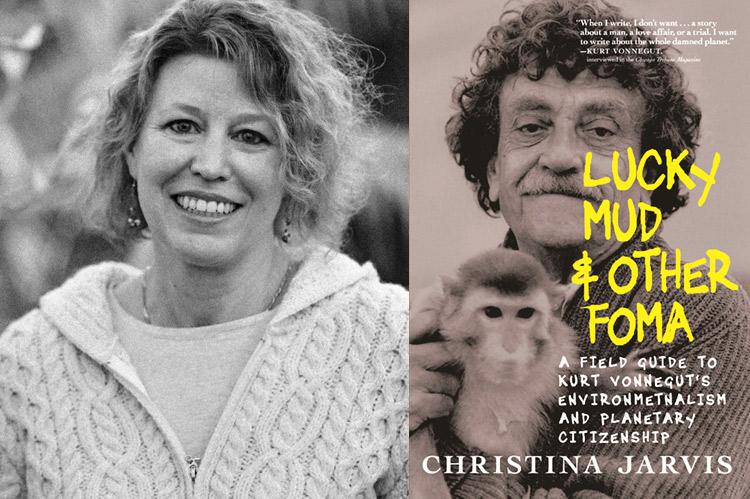“Lucky Mud & Other Foma”
Christina Jarvis
Seven Stories Press, $28.95
The well-being of our planet, and those who inhabit it, a common theme in Kurt Vonnegut's work, "Lucky Mud & Other Foma: A Field Guide to Kurt Vonnegut's Environmentalism and Planetary Citizenship" sees Christina Jarvis examine how the author got interested in environmental and social issues as a child and young man, and how he used his books and expanding public platform to share his heartfelt thoughts on the topics, and hopefully change a mind or two.
"This book tells the story of Vonnegut's planetary citizenship," Ms. Jarvis, a professor of English at the State University at Fredonia, writes in the introduction. "It discovers the origins of his environmental stewardship in lessons from Vonnegut's Orchard School teacher Hillis Howie and the ethics and political ideals forged during his teenage Western adventures. It also explores Vonnegut's deep attachments to place and the profound ways his biology, chemistry, and anthropology studies shaped his planetary thinking."
The book's title could use some deciphering. Lucky mud and foma are aspects of Vonnegut's invented religion, Bokononism, in his novel "Cat's Cradle." Lucky mud refers to mud tapped by God to sit up and take in the Earth around it, while foma denotes a harmless untruth.
Vonnegut grew up in Indianapolis, and later kept homes on Cape Cod and in Manhattan and Sagaponack, among other places. As Ms. Jarvis notes, as a teen Vonnegut would take camping and hiking trips to the Southwest led by Hillis Howie, a teacher and scout leader. On these ventures, and family vacations around Lake Maxinkuckee in his home state, Vonnegut's affection for nature blossomed. This trait developed as he read Henry David Thoreau in college.
As his literary career took off, humankind's stewardship of planet Earth, for better or for worse, emerged as a persistent theme. His second novel, "The Sirens of Titan," came out in 1959. Ms. Jarvis writes, "Born out of concerns about global annihilation via nuclear war, nurtured by his ecological awareness and the environmental movement, and heightened through his engagements with globalization and climate change, Vonnegut's writings call for careful stewardship of the Earth's life-supporting systems."
She looks at how he rides environmental themes in "Player Piano," "God Bless You, Mr. Rosewater," "Deadeye Dick," "Cat's Cradle," "Breakfast of Champions," and "Galapagos," among other books. She examines his short story "Ice-Nine," about a compound that freezes any water it comes in contact with, which he turned into "Cat's Cradle," about an atomic bomb's effect on the planet and its inhabitants.
In "Breakfast of Champions" a creek has been "polluted by some sort of industrial waste which formed bubbles as tough as ping-pong balls." Ms. Jarvis calls "Galapagos," about a group of humans shipwrecked on an island after a global financial crisis, at a time when a disease leaves humankind infertile, except for the people on the island, Vonnegut's "most explicitly environmental novel."
His green output was not limited to novels. A series of stickers bearing the rubric Rare Earth, from Vonnegut and Joel Cohen, a graphic artist, in 1993, show the planet roasting on a spit. "We could have saved it," the verbiage reads, "but we were too darn cheap and lazy."
Ms. Jarvis digs up interviews and Vonnegut's commencement speeches at various colleges, including SUNY Albany and Hobart and William Smith, where he urged the grads to keep our planet in mind as they stepped off campus and into the world. He also spoke at an anti-nuclear rally in Washington, D.C., just after the 1979 debacle at Three Mile Island, railing against the idea of creating weapons and electricity from "the most unstable substances and most persistent poisons to be found anywhere in the universe."
Lethal weapons and their impact on humans are, of course, a primary thrust in "Slaughterhouse-Five."
While much more is made of Vonnegut's two decades on Cape Cod, Ms. Jarvis notes how his time in Manhattan and Sagaponack put the author in contact with the nation's literary braintrust, with whom he could share his concerns about planetary citizenship. "Unlike his earlier homes, these domestic spaces put Vonnegut in close contact with his publishers, editors, critics, hundreds of fellow authors, and the extensive network of literary organizations that he actively participated in," she writes.
"Lucky Mud & Other Foma" is essentially a Vonnegut biography, from his childhood in Indiana to his death in New York, including his relationships and side pursuits, such as volunteer firefighting in upstate New York and working as a car salesman on Cape Cod, with his environmental and social concerns front and center. Ms. Jarvis knows the author's oeuvre intimately and spins a thoroughly researched, eminently readable, and often enjoyable account of one of America's true literary lions.
To be sure, the book is not for everyone. The reader may, at times, wonder if it would've worked better as, say, a 10,000-word New Yorker article, articulating Vonnegut's vision for a better Earth while freeing up a bit of time for the reader.
But true fans of Vonnegut will enjoy "Lucky Mud," and will respect how he was a champion of our planet's health several decades before other writers, celebrities, and citizens took up the cause.
A couple years before his 2007 death, Vonnegut published a book of essays and anecdotes called "A Man Without a Country." It ends with his poem "Requiem," which reads in part:
The crucified planet Earth,
Should it find a voice
And a sense of irony,
Might now well say
Of our abuse of it,
"Forgive them, Father,
They know not what they do."
Michael Malone, a previous Star contributor, has written for The Philadelphia Inquirer and The New York Times.

